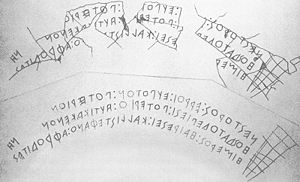Greek was a religious language on the first place.
Created by clergy for liturgy and religious writing.
Absolutely not. The artifacts show us that language was spread all over Mediteranean, especially into Roman centers, like Constandinople and Rome. It was excactly these Romans who can take the credits for the creation of the so called "Greek" language, which was in use during Paleochristianity and then based on Greek replaced by another Roman invention, the Latin language.
There was no any Greek civilisation during history, let alone a distinct ethnic group. If we will trust the un reliable "Ancient Literature" we hardly can associate the mythical religious elite called Hellenes(ethnonym: Ἕλλην), to the East Roman Christians called Romaioi( Ρωμαίος/Ρωμιός). The latest were not acknowledged as the inheritors of the Romans, but rather perceived to be continuation of Ancient Greeks in modern people eyes, and this is the crucial point understanding history. The ""Greeks"" have no ancienty, they are just a portion of the so called Romans, when the christianity had'nt 'gained' yet, that mistical character that has today.
Sory?
if you ever read Christian saints you will see that the termination Ελλην was a word simmilar to religia illicata,
Ellhn in Byzantine was synonym of not Christian,
If you search about Scythopolis and Theodosius etc they genocide millions of Greeks in order to establish Christianity.
East Roman Empire, how the citizen could be named?
2 options
1.) Greeks Ελληνες that meant Death
2.) Romans ρωμιοι that means acceptance of Christianity and emperror
so all citizen under roman empire were Ρωμιοι,
but were they?
the answer is no,
lets look at this video
http://www.youtube.com/watch?v=vd6hJ5YKOp0
it even follows Pythagoreian armony of 1/2 1/3 1/4
In south Italy Latin is the primary Church language,
How come these people speak Greak and the one of the 2 Doric dialects still alive?
the best reply to you is this video
[video=youtube;UcAYP4irSyQ]http://www.youtube.com/watch?feature=player_embedded&v=UcAYP4irSyQ[/video]
as you Pontic Greeks speak simmilar with Hellenes Ελληνες of 6th-7th century BC
while that language is not Hellenistic but more old,
in the Biblical and Christian Greek infinitive drops to 1 while these people have 4 and Homeric had 6
the usage of Aorist sends us at least 600 years before the translation of 70 to Hellenistic
they name them shelves Roumans Ρουμαικα cause in that land a terrible Saint name Basileios from Ceasareia who even dare to challenge Jullian as Apostate and probably murder him as some Historians say when he was in fight against Persians
Yet some ancient Greek custom survive to them as The momogeroi μωμογεροι which is known to every ancient Greek as festivals dedicated to God Komos or Momos Κωμος, after him comedy has its name,
youtube;mnikI0kAYzs]http://www.youtube.com/watch?v=mnikI0kAYzs&feature=related
As you see these festivals later in Greece become Dionysus Fests but not in them,
and the strange is that existed in Thracians Phrygians even to Kallash
besides take a look at all ancient Greek dances, they have 1 common,
that is the hit on the ground,
from all the word 3 nations hit the Ground,
1. Zulu
2 Laz Kurds and the rest Aryan
3 Greeks
why? ask Κουρητες.
SO IF GREEK WAS A CLERGY LANGUAGE, HOW COME MITHRIDATES PEOPLE SPEAK A LANGUAGE BEFORE THE GREEK OF EAST CHURCH? in FACT OLDER THAN THE KNOWN THETRICAL DRAMAS?
WERE THEY LEARN IT? IN SCHOOLS? in UNIVERSITIES?
IN 1821 the head of Greek revolt Υψηλαντης
http://en.wikipedia.org/wiki/Alexander_Ypsilantis
in order to decide the name of the new state had a problem with church,
church wanted to name the state after Byzantines as Rome Ρωμυλια etc
Ypsilantis was expelled by all East Churches and was burried in Wienn cause he ramed it Greek Eλληνικον.
after the language and customs of the local people.
What I wonder is that Greek still are spoken in Ucraine Georgia Turkey Egypt were the Church does not Speak Greek,
WHY?
why people in South Italy still speak and sing in Greek and not in Latin which is the Church language
there?
only 1 answer
GREEK or ΕΛΛΗΝΕΣ Were, are (and will be?) a nation and not a religious class or a sum of believers.
If Greek was a clergy language?
How Do you explain that Greek is Spoken in Ucraine Russia Georgia France Egypt and South Italy? where the church speaks Russian Georgian Latin etc???










